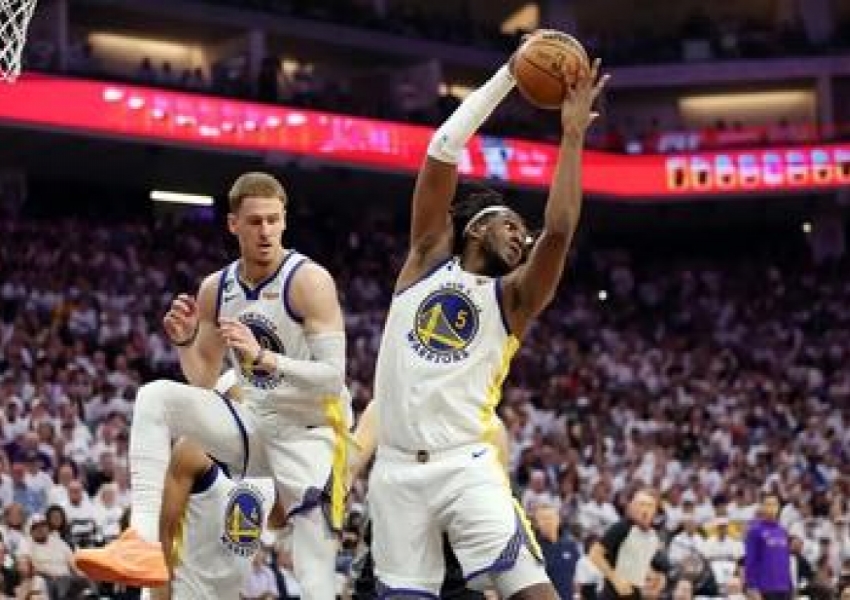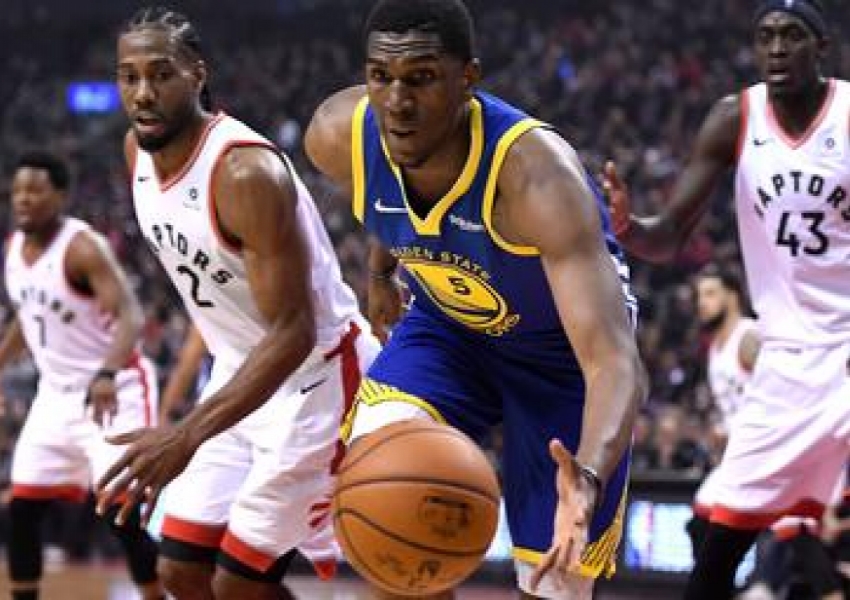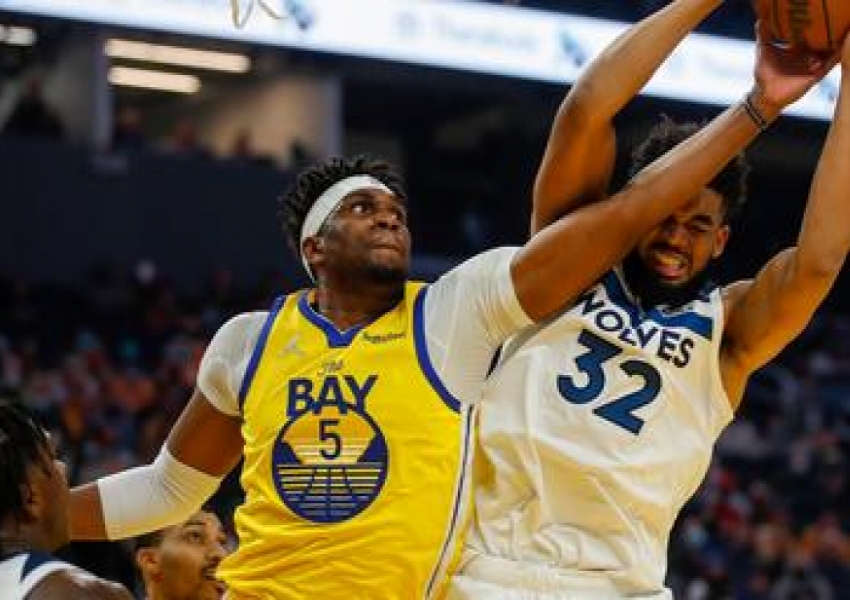What Defines Genius? From Guard to Center, Overcoming a 50% Decrease in Talent, Yet Still Becoming a Top NBA Star
In the world of professional sports, the term "genius" is often reserved for those athletes whose innate skills seem almost otherworldly. But the true essence of genius isn’t always about raw talent. Sometimes, it’s about the ability to adapt, evolve, and rise above adversity. Kevin Looney, a name not always at the forefront of the Golden State Warriors dynasty, might not be the first player that comes to mind when discussing NBA greats, but his story represents a unique kind of brilliance.

Looney’s path to the NBA was anything but conventional, and while he may not have been born with the same natural gift for scoring as some of his peers, he has crafted a career through sheer willpower, adaptability, and an uncanny understanding of the game. His transformation from a guard with dreams of becoming the next Kobe Bryant to a defensive powerhouse at the center position is a testament to his resilience and basketball IQ.

Looney grew up in a stable, middle-class family, a sharp contrast to the often tumultuous childhoods of many of his NBA contemporaries. His father, Doug Looney, was a basketball star in Tennessee, even playing alongside former NBA player Elston Turner. Together, they helped lead Austin East High School to a state championship. Unfortunately, Doug’s basketball career was cut short due to a finger injury that led to lasting complications, preventing him from reaching the professional ranks. However, Doug would become Kevin’s first and most influential coach, shaping his early training regimen.

From an early age, Looney was subject to an intense, structured workout schedule. His father would wake him up at 5 AM for a gym session, followed by hours of ball handling, shooting drills, and body conditioning before heading to school. After school, Looney would repeat the process, with his father making sure he maintained a disciplined routine that was both mentally and physically demanding.
By the time Looney entered high school, he was already a standout player, thanks to his rigorous training and his father’s basketball knowledge. His skills were refined, his basketball IQ was sharp, and his body began to show signs of growth, reaching a height of 6'8" and weighing in at 216 pounds by the time he entered his sophomore year. Looney’s physical traits—long arms and a high vertical leap—made him a force on the court. Initially, he played as a guard, his dream being to follow in the footsteps of one of his idols, Kobe Bryant. Looney mimicked Bryant's style, downloading endless highlight reels and practicing his footwork and shooting.
However, as Looney progressed into high school, his body began to change. His height and weight gave him the physical attributes to dominate on both ends of the floor, but it also forced him to reconsider his future position. His guard skills were no longer suited for a player with his size. Instead of focusing solely on scoring, Looney began to embrace the idea of versatility, knowing that his athleticism and basketball IQ could carry him across all five positions.
During his high school career, Looney’s ability to play multiple positions became apparent. As a senior, he averaged 27.9 points, 12.7 rebounds, 7 assists, and 8 blocks per game, making him a five-star recruit and one of the best players in the country. His game was often compared to that of Kevin Durant, a player with similar height and skill set. With such accolades, it wasn’t surprising that Looney received offers from several top universities, ultimately choosing UCLA for its promise of a personalized "sports biology" curriculum. At UCLA, Looney hoped to refine his game further while preparing for a future in the NBA.
But destiny had other plans. Just as Looney was beginning to envision his professional career, disaster struck in the form of a hip injury while training at UCLA’s gym. This injury proved to be a game-changer, forcing Looney to rethink his entire approach to basketball. The doctors discovered that his pelvis was growing too quickly for the soft tissue to keep up, putting tremendous strain on his hips. To protect his vulnerable hip area, Looney had to gain weight, ultimately pushing his body to 246 pounds. While this change improved his physical strength and ability to withstand contact, it came at a cost—his speed and agility were compromised, and his lateral quickness took a significant hit.
Looney was forced to shift gears entirely. The sleek, quick guard with aspirations of being a high-flying scorer had to reinvent himself as a big man, specifically a center. He no longer had the luxury of relying on his guard skills. He had to work tirelessly to develop a new set of skills, focusing on defense, rebounding, and low-post play. His transition from guard to center was a daunting task, but Looney’s work ethic, basketball IQ, and determination allowed him to make the switch seamlessly.
Despite the challenges, Looney showed remarkable progress. In one of his early games at UCLA, he grabbed 17 rebounds, with nine of them coming from preemptive positioning. His ability to predict where the ball would land and to position himself accordingly was uncanny, with his rebounding instincts outpacing those of many seasoned players. It was this high basketball IQ that helped Looney secure a spot in the NBA, even though his draft stock had taken a hit due to the unexpected change in his game.
Looney was selected 30th overall in the 2015 NBA Draft by the Golden State Warriors, a team that had a crowded frontcourt but saw potential in Looney’s versatile game. While it took a few years for Looney to carve out a regular role in the Warriors' lineup, his time spent developing with the team’s medical and training staff proved invaluable. The Warriors' medical team realized that Looney’s hips could no longer handle the weight he had gained, and they helped him trim down to 240 pounds, a weight that would allow his hips to function optimally. This adjustment allowed Looney to regain some of his quickness and explosiveness.
Additionally, the Warriors' training staff focused on Looney’s movement mechanics, helping him change his approach to jumping and rebounding. By shifting from using his legs to leveraging his long wingspan and quick reflexes, Looney became a formidable force on the boards. His defense and ability to read the game set him apart from others, and his commitment to team-first principles made him a key part of the Warriors’ success.
Looney’s role within the Warriors system evolved rapidly. In the 2021-2022 season, Looney was finally thrust into the starting lineup. He had previously been seen as a backup player, contributing on defense and grabbing crucial rebounds. But during the Warriors' championship run in 2022, Looney was a pivotal part of the team’s success. His contributions on the boards, particularly his ability to grab offensive rebounds, were crucial in several games. His performance in Game 2 of the Western Conference Finals, where he posted 21 points and 12 rebounds, solidified his place as a key contributor.
Looney’s rise to prominence wasn't built on flashy stats or highlight-reel plays; it was based on doing the dirty work that wins championships—rebounding, defending, and setting screens. His basketball IQ and adaptability made him an indispensable part of the Warriors’ system. While players like Stephen Curry and Klay Thompson are often credited with the Warriors’ success, Looney's unrelenting work ethic and team-first mentality were instrumental in their title runs.
As for his father, Doug Looney, he never stopped supporting Kevin’s journey. Doug watched every home game, keeping track of the stats and helping his son focus on what truly mattered: rebounds. "I used to care about scoring, but now I just care about the rebounds," Doug would tell Kevin. "Rebounds are what matter for you on this team."
Kevin Looney’s story isn’t one of pure, untapped talent like many of the game’s stars. Instead, it’s a story of persistence, adaptation, and overcoming adversity. From being a high-flying guard with dreams of scoring like Kobe Bryant to becoming a defensive powerhouse in the paint, Looney’s journey is a testament to the power of reinvention. His ability to transform his game and continue to thrive in the NBA, despite being forced to abandon his initial path, is the true definition of basketball genius.
Copyright Statement:
Author: focusnba
Source: FocusNBA
The copyright of this article belongs to the author. Reproduction is not allowed without permission.
Recommended Blog
- Rockets vs Warriors Game 1: The Curry-Buttler Show Shines, Where Did the Rockets Go Wrong?
- 0+0+0+0+0! Just How Bad is Kyle Kuzma Right Now?
- Devastating 75-Point Loss! Morant vs. Gilgeous-Alexander: Will There Be a Miracle?
- Truly Impressive! A Late-Blooming Talent Delivers: From 12+6+4 to 20+9+9, $30 Million Contract Locked
- Official Announcement! Lakers Extend Rob Pelinka's Contract! His Legendary Moves Go Beyond Luka Doncic!
- The Shorter the News, the Bigger the Event! Is the Kings' Big 3 on the Chopping Block?
- +31 Plus-Minus! Klay's Redemption Game, Can Mavericks Pull Off a Play-In Miracle?
- Countdown to Zion's Departure: Does 24-Year-Old Zion Williamson Still Have Value?
- No Regrets! Mavs Management Responds Again on Doncic Trade, Still Standing Firm?
- Best Sixth Man? Just How Good Is Payton Pritchard, Who Earns $6.7 Million a Year?